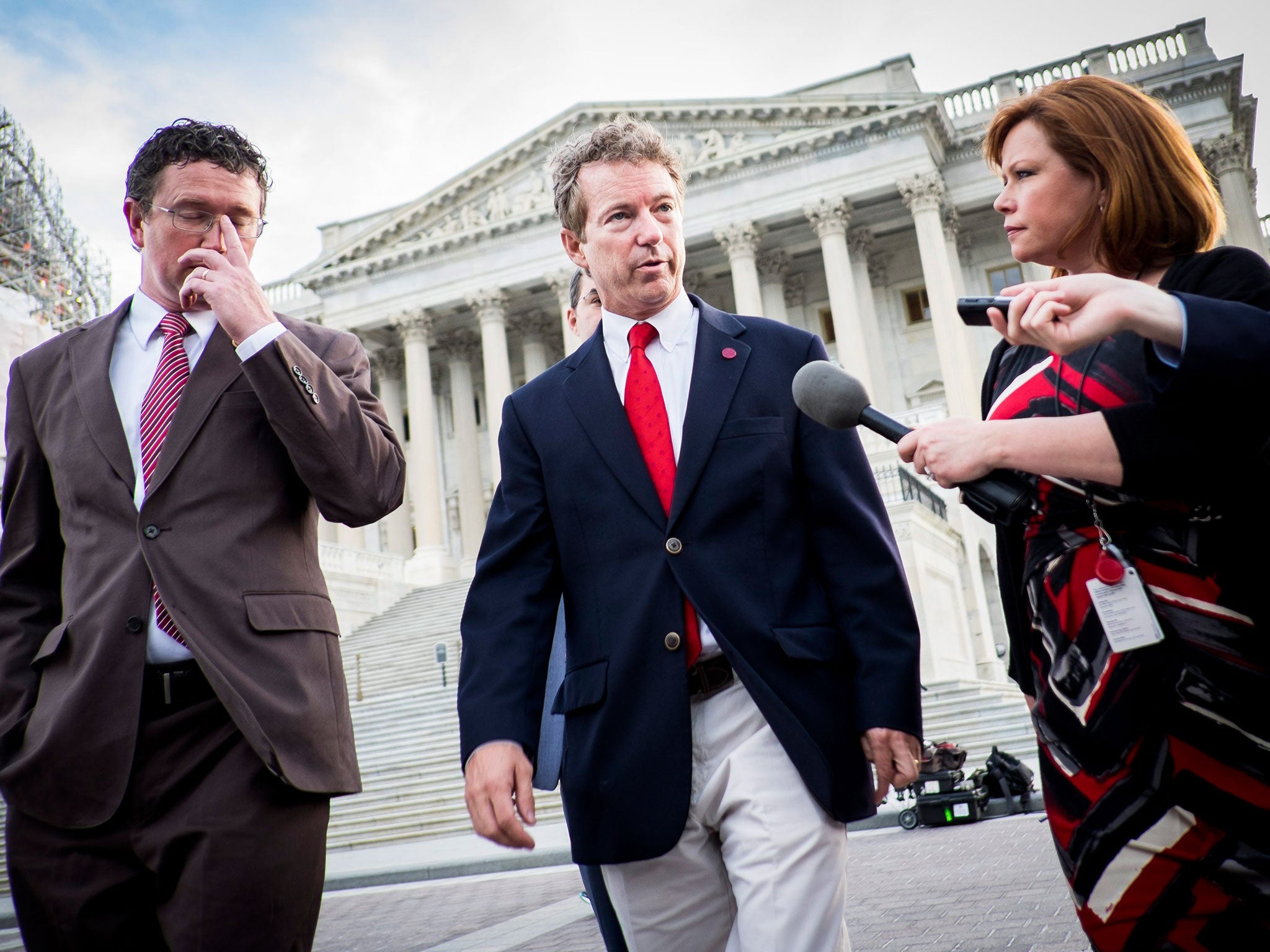Snoopers stumped as Rand Paul makes stand against US government collection of phone 'metadata'
Presidential hopeful defies Republican colleagues to block an extension of provisions for the 2001 Patriot Act

Your support helps us to tell the story
From reproductive rights to climate change to Big Tech, The Independent is on the ground when the story is developing. Whether it's investigating the financials of Elon Musk's pro-Trump PAC or producing our latest documentary, 'The A Word', which shines a light on the American women fighting for reproductive rights, we know how important it is to parse out the facts from the messaging.
At such a critical moment in US history, we need reporters on the ground. Your donation allows us to keep sending journalists to speak to both sides of the story.
The Independent is trusted by Americans across the entire political spectrum. And unlike many other quality news outlets, we choose not to lock Americans out of our reporting and analysis with paywalls. We believe quality journalism should be available to everyone, paid for by those who can afford it.
Your support makes all the difference.Almost 14 years since the 9/11 terrorist attacks that prompted its creation, the US National Security Agency’s controversial phone “metadata” collection programme ground to a halt at 12.01 yesterday morning, after Republican Senator Rand Paul defied colleagues to block a vote on its extension.
Mr Paul, a libertarian and long-shot 2016 presidential hopeful, objected to attempts by his fellow Senate Republicans to extend key provisions in the 2001 Patriot Act, which permitted the NSA to scoop up Americans’ phone records under the guise of counter-terrorism. Those provisions expired at midnight on Sunday, and intelligence officials said they had begun winding up the bulk data collection system on Sunday afternoon, as it became clear the Senate would not reach an agreement before the deadline.
The programme cannot resume until after Senators vote on a new bill limiting NSA powers, which was passed last month by the House but previously rejected by Senate Republicans, who argued that it would restrict the NSA’s capacity to act quickly in the event of a terrorist threat.
Starved of alternatives, however, Republican Senate Majority Leader Mitch McConnell announced he would now back the House bill, known as the USA Freedom Act, which demands phone records be stored by phone companies, rather than by the government, and that intelligence agencies can only acquire them with the approval of a so-called Fisa court, which oversees the legitimacy of domestic surveillance operations.
Senators voted 77 to 17 on Sunday to take up the bill, which President Obama has indicated he supports, and the Senate will is expected to return a compromise version to the House today or tomorrow. Mr Paul, who admitted he would be unable to prevent the new bill’s passage, told reporters, “The point I wanted to make is that we can still catch terrorists using the Constitution.”
The lapse of the Patriot Act provisions means the NSA must cease collection of phone metadata - details of all numbers called and the duration of each call, but not of their content. It also means the FBI cannot invoke the Act to eavesdrop on terrorism suspects who change their phones, or who are considered “lone wolves” unattached to a terror group. There are reportedly legal loopholes that will allow intelligence officials to continue operations, and some existing investigations are likely to continue under a so-called “grandfather clause”.
Nevertheless, the expiration of NSA powers – albeit partial and probably temporary – marks a significant shift in the balance between security and privacy, and represents the continuing fallout from the exposure of the metadata programmes by NSA whistleblower Edward Snowden in 2013.
“I have fought for several years now to end the illegal spying of the NSA on ordinary Americans,” Mr Paul said in a statement. “Forcing us to choose between our rights and our safety is a false choice and we are better than that as a nation and as a people.”
Yet Mr Paul’s efforts to block the bill infuriated his more hawkish Republican colleagues, several of whom accused him of grand-standing in an effort to bolster his lacklustre presidential campaign. Republicans filed out of the Senate chamber to express their anger as the Kentucky Senator rose to object to the House bill on Sunday evening.
Former Republican presidential nominee Senator John McCain told reporters Mr Paul had placed “a higher priority on his fund raising and his ambitions than on the security of the nation,” adding he considered Mr Paul the “worst candidate” to have lined up for the party’s 2016 nomination.
Invoking the threat of Al-Qaeda and Isis, Republican House Speaker John Boehner said: “Anyone who is satisfied with letting this critical intelligence capability go dark isn’t taking the terrorist threat seriously.” The White House, meanwhile, issued a statement as the NSA’s authorities expired, saying: “We call on the Senate to ensure this irresponsible lapse in authorities is as short lived as possible. On a matter as critical as our national security, individual senators must put aside their partisan motivations and act swiftly. The American people deserve nothing less.”
Join our commenting forum
Join thought-provoking conversations, follow other Independent readers and see their replies
Comments